Refine search
Actions for selected content:
56 results
1 - Introduction: The Personal Is Political – How I Came to Write This Book
-
- Book:
- Tied Up in Tehran
- Published online:
- 28 September 2025
- Print publication:
- 16 October 2025, pp 1-23
-
- Chapter
- Export citation
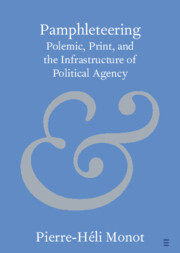
Pamphleteering
- Polemic, Print, and the Infrastructure of Political Agency
-
- Published online:
- 05 September 2025
- Print publication:
- 02 October 2025
-
- Element
-
- You have access
- Open access
- HTML
- Export citation
Finding Meaning in the Rules of the Game? German Social Democrats and Parliamentary Debate, 1860–90
-
- Journal:
- Central European History , First View
- Published online by Cambridge University Press:
- 04 August 2025, pp. 1-22
-
- Article
-
- You have access
- Open access
- HTML
- Export citation
Jinty Nelson in Thirteen Articles
-
- Journal:
- Transactions of the Royal Historical Society , First View
- Published online by Cambridge University Press:
- 23 July 2025, pp. 1-25
-
- Article
-
- You have access
- Open access
- HTML
- Export citation
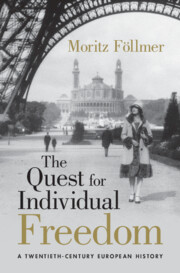
The Quest for Individual Freedom
- A Twentieth-Century European History
-
- Published online:
- 12 April 2025
- Print publication:
- 10 April 2025
Introduction
-
- Book:
- The Quest for Individual Freedom
- Published online:
- 12 April 2025
- Print publication:
- 10 April 2025, pp 1-10
-
- Chapter
-
- You have access
- HTML
- Export citation
2 - Global Conjunctures and the Remaking of European Political History
-
-
- Book:
- Globalizing Europe
- Published online:
- 06 March 2025
- Print publication:
- 13 March 2025, pp 27-41
-
- Chapter
- Export citation
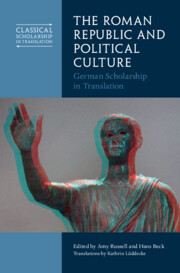
The Roman Republic and Political Culture
- German Scholarship in Translation
-
- Published online:
- 30 January 2025
- Print publication:
- 06 February 2025
Labour Pains: Mothers and Motherhood on the British Left in the Twentieth Century
- Part of
-
- Journal:
- Transactions of the Royal Historical Society , First View
- Published online by Cambridge University Press:
- 23 January 2025, pp. 1-22
-
- Article
-
- You have access
- Open access
- HTML
- Export citation
3 - Long Nineteenth Century
- from Part II - History
-
- Book:
- Contesting Pluralism(s)
- Published online:
- 19 December 2024
- Print publication:
- 02 January 2025, pp 61-94
-
- Chapter
- Export citation
The Enigma of San Francisco: Henry George and the Historians
-
- Journal:
- The Journal of the Gilded Age and Progressive Era / Volume 24 / Issue 1 / January 2025
- Published online by Cambridge University Press:
- 25 February 2025, pp. 73-92
- Print publication:
- January 2025
-
- Article
- Export citation
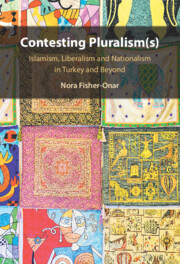
Contesting Pluralism(s)
- Islamism, Liberalism, and Nationalism in Turkey and Beyond
-
- Published online:
- 19 December 2024
- Print publication:
- 02 January 2025
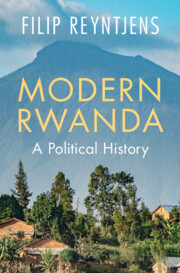
Modern Rwanda
- A Political History
-
- Published online:
- 14 November 2024
- Print publication:
- 21 November 2024
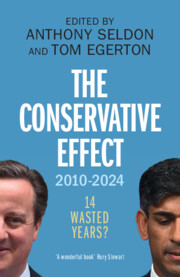
The Conservative Effect, 2010–2024
- 14 Wasted Years?
-
- Published online:
- 24 July 2024
- Print publication:
- 27 June 2024
Conclusion: Fourteen Wasted Years? The Verdict
-
-
- Book:
- The Conservative Effect, 2010–2024
- Published online:
- 24 July 2024
- Print publication:
- 27 June 2024, pp 508-525
-
- Chapter
- Export citation
2 - External Shocks
-
-
- Book:
- The Conservative Effect, 2010–2024
- Published online:
- 24 July 2024
- Print publication:
- 27 June 2024, pp 37-70
-
- Chapter
- Export citation
Chapter 2 - The Republican Genealogy and the Normative Temptation
-
- Book:
- Intellectual History and the Problem of Conceptual Change
- Published online:
- 02 May 2024
- Print publication:
- 09 May 2024, pp 38-53
-
- Chapter
- Export citation
A pivot point in Maya history: fire-burning event at K'anwitznal (Ucanal) and the making of a new era of political rule
-
- Article
-
- You have access
- Open access
- HTML
- Export citation
Epilogue
-
- Book:
- Politics of the Past
- Published online:
- 05 April 2024
- Print publication:
- 11 April 2024, pp 237-252
-
- Chapter
- Export citation
The Left Wing Turn to Human Rights in Tunisia
-
- Journal:
- International Journal of Middle East Studies / Volume 56 / Issue 1 / February 2024
- Published online by Cambridge University Press:
- 16 February 2024, pp. 18-37
- Print publication:
- February 2024
-
- Article
- Export citation
